Track
Businesses are increasingly paying attention to AI agent applications due to the rise of multi-agent systems, advanced automation, and the demand for real-time insights. Since they can boost the productivity of businesses of any size, they are highly relevant for both startups seeking agility and large enterprises aiming to scale efficiently.
In this blog, I will cover industry-specific use cases of AI agents across many fields like finance, healthcare, education, and more. If you want to start learning how to use AI agents for your business needs, I recommend these hands-on tutorials:
Introduction to AI Agents
AI Agents in Finance
Use cases
Let’s start with one of the most prominent sectors when it comes to AI agent applicability. There are plenty of compelling AI agent use cases in the financial sector, such as:
- Fraud detection agents
- Autonomous trading bots
- Customer onboarding assistants
Fraud detection is a major challenge for banks, as traditional systems often struggle to keep up with the speed and complexity of modern cybercrime. AI agents address this by continuously monitoring transactions, learning customer behavior, and flagging anomalies in real time, which allows for faster and more accurate identification of suspicious activity.
At JPMorgan Chase, for instance, implementing AI-powered fraud detection has resulted in massive cost savings, a dramatic reduction in false positives, and the ability to catch fraudulent transactions up to 300 times faster than before, greatly improving both security and customer trust.
In financial markets, managing risk and executing trades swiftly is important, but human traders can be limited by speed and data processing capacity. Autonomous trading bots powered by AI agents aim to solve this by analyzing market data, executing trades automatically, and adjusting risk controls in real time based on evolving conditions.
If you had to open a financial account lately, you might know that customer onboarding and KYC (Know Your Customer) compliance are often slow and error-prone due to manual document checks and risk assessments. AI agents can improve this process by instantly verifying documents, assessing client risk profiles, and automating compliance checks, all while maintaining high accuracy.
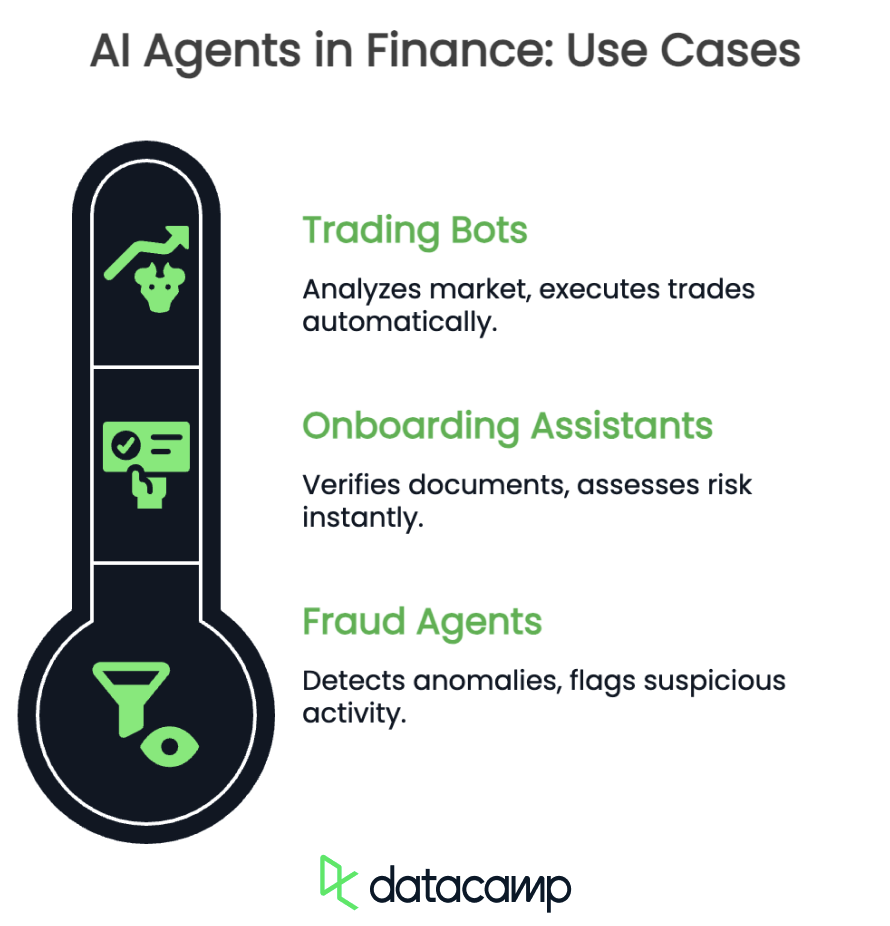
Benefits
AI agents in finance deliver significant benefits by increasing speed and enabling real-time responses to market changes, fraud attempts, and customer needs. Their ability to process vast amounts of data instantly means financial institutions can detect risks, execute trades, and resolve issues far faster than traditional methods allow.
Additionally, AI agents help firms stay ahead of regulatory requirements by automating compliance checks and maintaining accurate records, reducing the risk of costly errors and penalties.
Challenges
Many advanced AI models operate as "black boxes," making it difficult for financial institutions to explain their decision-making processes, which can undermine trust and complicate regulatory compliance, especially as transparency is crucial for both customers and regulators.
Additionally, AI-driven trading can create dangerous feedback loops when multiple agents react to the same market signals simultaneously, leading to herding behavior and potentially turning minor fluctuations into major market disruptions.
Security is another major concern, as decentralized and third-party AI deployments can introduce vulnerabilities, expose sensitive data, and increase the risk of cyberattacks or systemic failures that could impact a wide segment of the financial system.
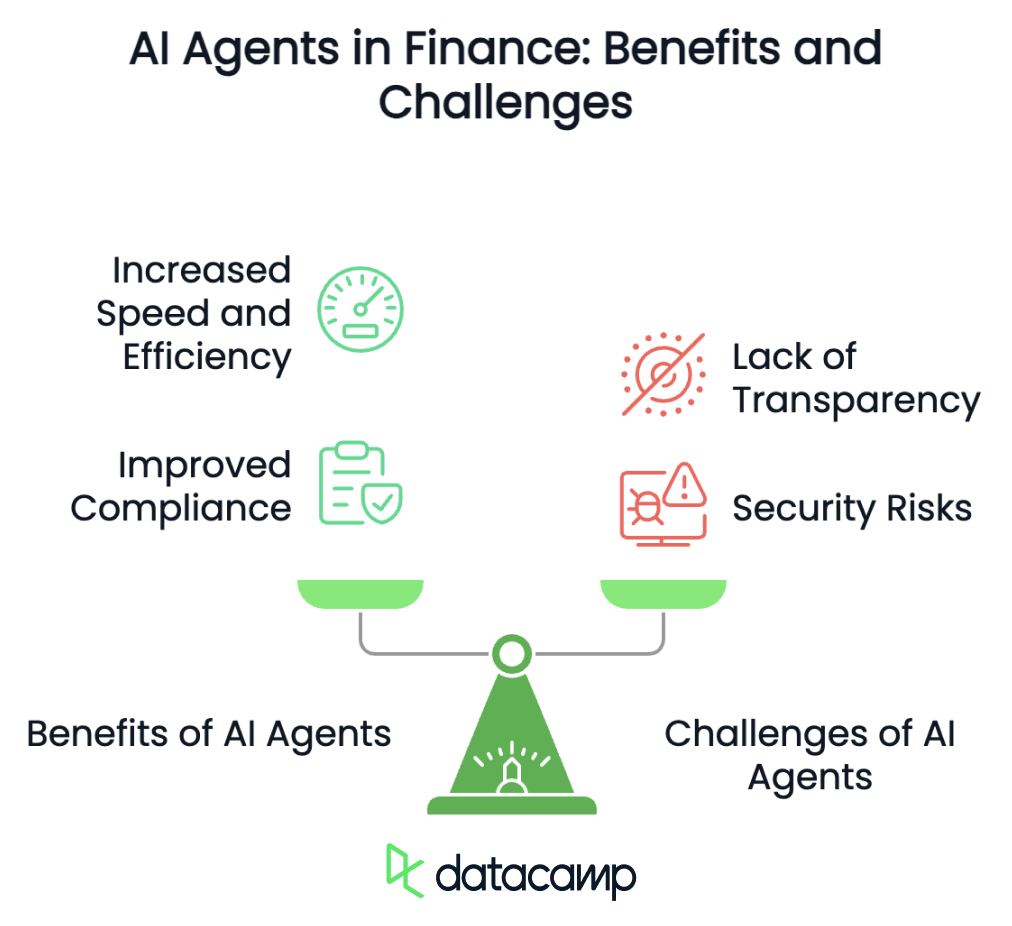
AI Agents in Healthcare
Use cases
Advances in AI agents offer a promising outlook for numerous healthcare applications, including:
- Virtual care agents for appointment scheduling and symptom triage
- AI agents supporting diagnostics by summarizing EHR data
- Multi-agent systems for hospital logistics
Healthcare providers struggle with inefficient appointment scheduling and initial patient assessment, leading to administrative burden and delayed care. Virtual care agents solve this by automating appointment booking, collecting patient information, and performing initial symptom triage through conversational interfaces that guide patients and route them to appropriate care levels.
Clinicians face information overload when analyzing patient data, making it difficult to identify patterns, anomalies, or make timely diagnostic decisions. AI diagnostic agents address this challenge by analyzing vast amounts of electronic health records, medical images, and laboratory results to identify patterns, flag anomalies, and provide decision support for healthcare providers.
To give you one real-world example: Ada Health's symptom checker agent, used by millions globally, uses natural language processing and medical logic trees to assess over 30,000 medical conditions and route users to telemedicine or emergency care based on urgency.
Hospital logistics and resource management are complex challenges as well, involving coordination across multiple departments. To tackle inefficiencies in equipment utilization and staff allocation, multi-agent systems create networks of specialized AI agents that track assets, predict maintenance needs, and optimize resource allocation across hospital facilities.
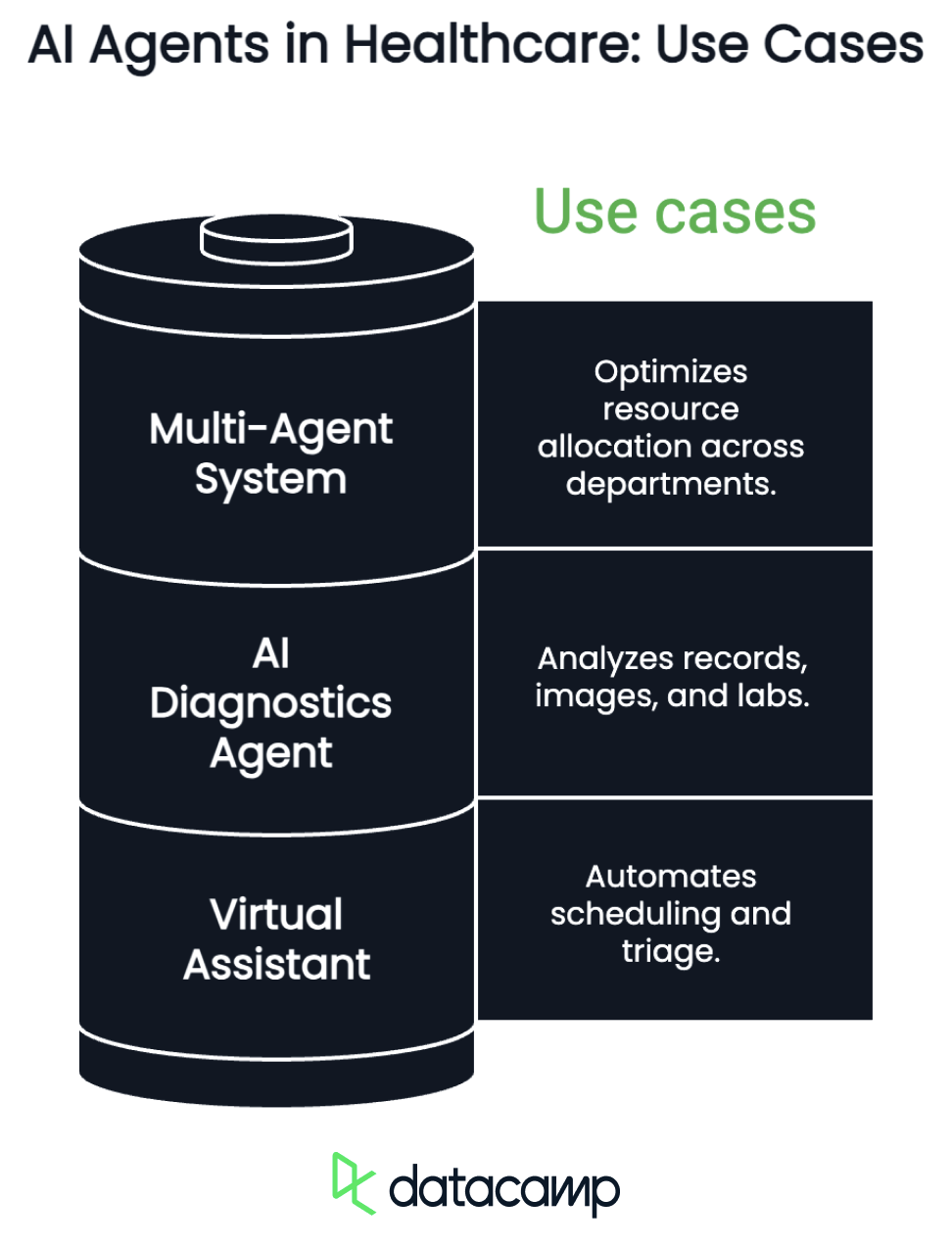
Benefits
AI agents in healthcare deliver significant benefits by improving patient care through personalized recommendations, faster response times, and improved treatment outcomes.
By analyzing vast amounts of patient data to identify patterns, flag anomalies, and provide evidence-based treatment suggestions, they enable healthcare providers to make more informed decisions. This can mean that lives are saved, for instance when it comes to detecting complications earlier than through traditional methods.
Beyond clinical applications, AI agents improve healthcare operations by automating administrative tasks like scheduling, claims processing, and data entry, reducing the burden on healthcare staff. This operational efficiency allows clinicians to focus more on patient care rather than paperwork.
Challenges
Despite their promise, AI agents in healthcare face significant challenges around data privacy, bias, and integration with existing systems. Patient data is obviously highly sensitive, and ensuring strong security and compliance with regulations like HIPAA is complex, especially as AI agents often require access to large, diverse datasets. Additionally, if the data used to train these agents is incomplete or biased, the resulting recommendations may inadvertently lead to inaccurate diagnoses.
Another major challenge is the integration of AI agents into the daily workflows of healthcare providers, who may be skeptical of new technologies or concerned about explainability. Many AI models function as “black boxes,” making it difficult for clinicians to understand or trust their recommendations, which can hinder adoption.
Ensuring proper governance, ongoing validation, and clear communication between technical teams and medical staff is essential to building trust and maximizing the benefits of AI agents in real-world healthcare environments.
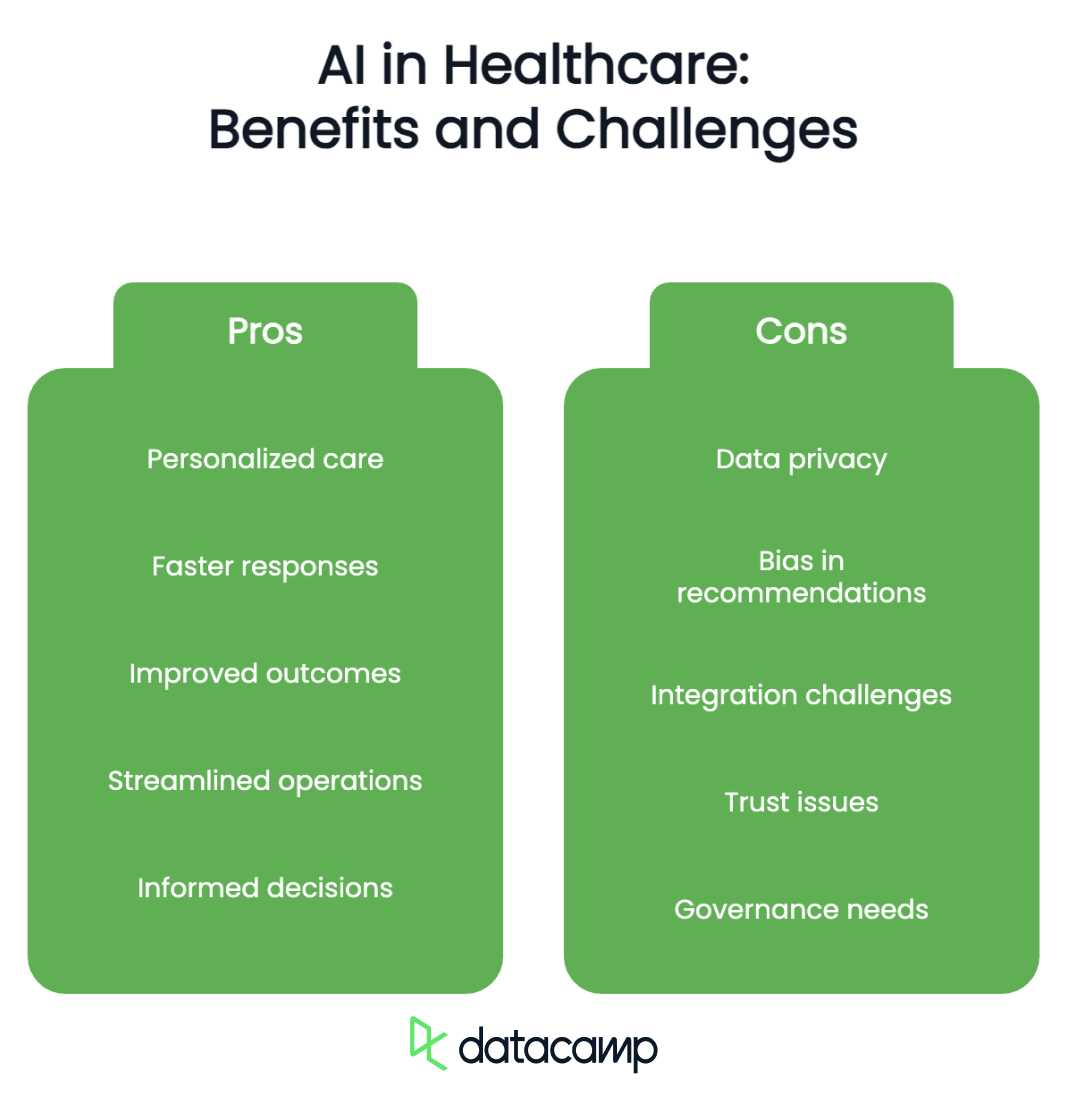
AI Agents in Customer Service
Use cases
Customer support is one of the areas where AI agents have already gained widespread adoption, with chatbots and virtual assistants handling millions of customer inquiries daily across industries. Use cases include:
- AI chat agents for customer interaction
- Multi-agent orchestration
- Sentiment-aware agents
Traditional Tier 1 support, which is the first line of customer service that handles basic inquiries, often struggles with inefficient manual processes, leading to delayed responses and frustrated customers. AI chat agents solve this by automating routine inquiries, triaging issues, and intelligently escalating only complex cases that require human intervention.
Lyft has successfully implemented AI agents using Anthropic’s model Claude in their customer service, cutting resolution times by an impressive 87% through smart AI-human handoffs that gather context before escalation.
Businesses face challenges when customers have diverse needs requiring different expertise, creating bottlenecks and inefficiencies in support workflows. Multi-agent orchestration solves this by creating specialized AI agents that handle specific domains like billing or technical support, with efficient handoffs between agents when a query crosses expertise boundaries.
Finding the right tone is key when dealing with customers, but customer service teams often struggle to manage emotionally charged interactions that can damage customer relationships and lead to churn. Sentiment-aware agents address this by analyzing customer tone and language in real-time, automatically adjusting communication style or triggering de-escalation techniques when detecting frustration or anger.
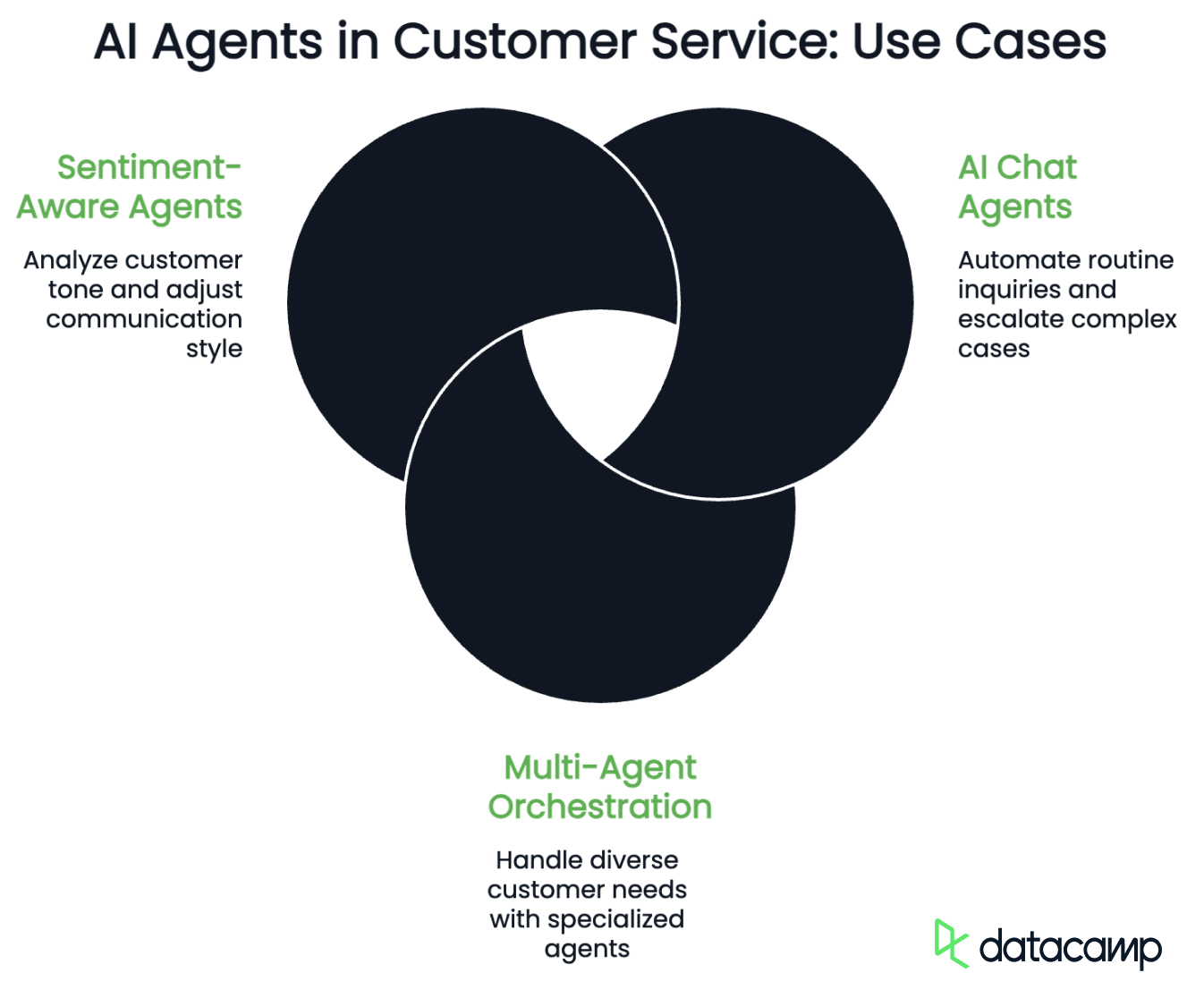
Benefits
AI agents dramatically reduce customer wait times by handling multiple inquiries simultaneously, eliminating the frustration of being placed on hold. Unlike human agents who can only manage one conversation at a time, AI support systems can process thousands of requests concurrently. Providing immediate responses to common questions and basic troubleshooting translates directly to customer satisfaction.
The 24/7 availability and consistency of AI agents represent another advantage for businesses operating in a global marketplace. They never sleep, take breaks, or have bad days, ensuring customers receive the same quality of service at 3 AM as they would during business hours.
This reliability creates a predictable customer experience across all interactions, eliminating the variability that comes with human agents who might interpret policies differently or have fluctuating performance levels.
Challenges
Integrating AI agents with CRMs and ticketing systems presents significant technical challenges, particularly around system compatibility and data synchronization. Legacy customer support platforms often lack the flexibility needed for AI frameworks, with incompatible data formats and limited API capabilities requiring businesses to invest in middleware or custom connectors.
Another major hurdle is maintaining real-time functionality while dealing with API rate limits and versioning issues. Many third-party systems impose restrictions on API calls, limiting the volume of data an AI agent can access within a given timeframe, potentially causing incomplete data ingestion or synchronization delays.
Additionally, CRM platforms frequently update or deprecate their APIs, creating compatibility drift that requires constant monitoring and adaptation to prevent disrupted workflows or data loss.
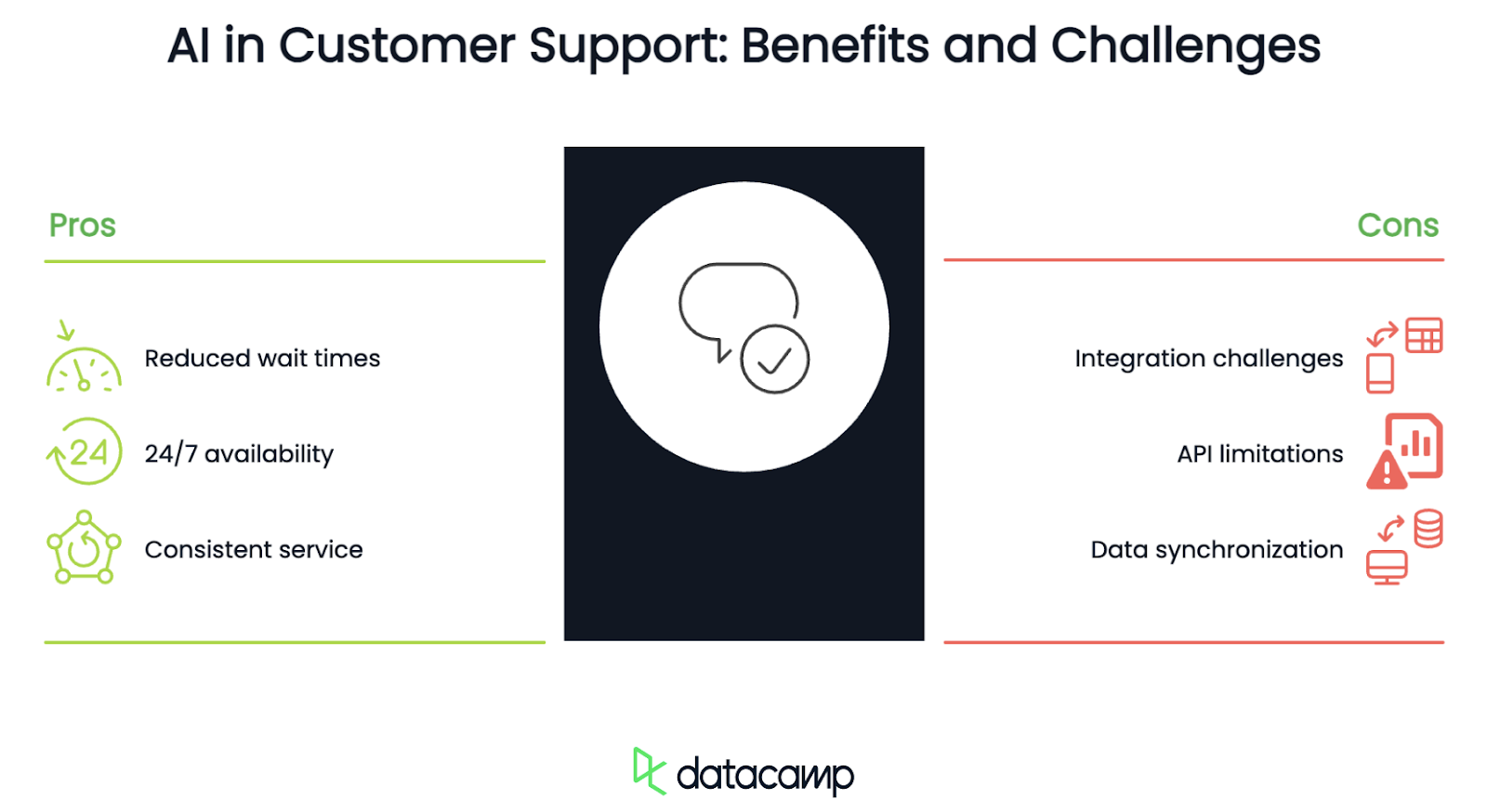
AI Agents in Education
Use cases
Education is another field in which AI agents can make a meaningful difference. Examples include:
- Personalized tutoring agents
- AI classroom assistants
- Language learning agents for real-time conversation
Traditional education struggles to accommodate diverse learning styles and paces, leading to gaps in understanding and student disengagement. Personalized tutoring agents solve this by continuously analyzing student performance data and dynamically adjusting content difficulty, learning paths, and teaching methods to match individual learning styles and address knowledge gaps in real time.
Teachers face overwhelming workloads with lesson planning, content creation, and grading, leaving limited time for meaningful student interaction. AI classroom assistants address this challenge by automating administrative tasks, generating customized lesson plans, creating assessments, and providing objective grading with detailed feedback, freeing educators to focus on direct student support.
Limited practice opportunities, inconsistent feedback, and anxiety about making mistakes are the big adversaries of any language learner, hindering their progress and confidence. Language learning agents solve these challenges by providing 24/7 access to conversation practice with human-like AI that adapts to the learner's level, offers immediate corrections, and creates a pressure-free environment where mistakes become learning opportunities.
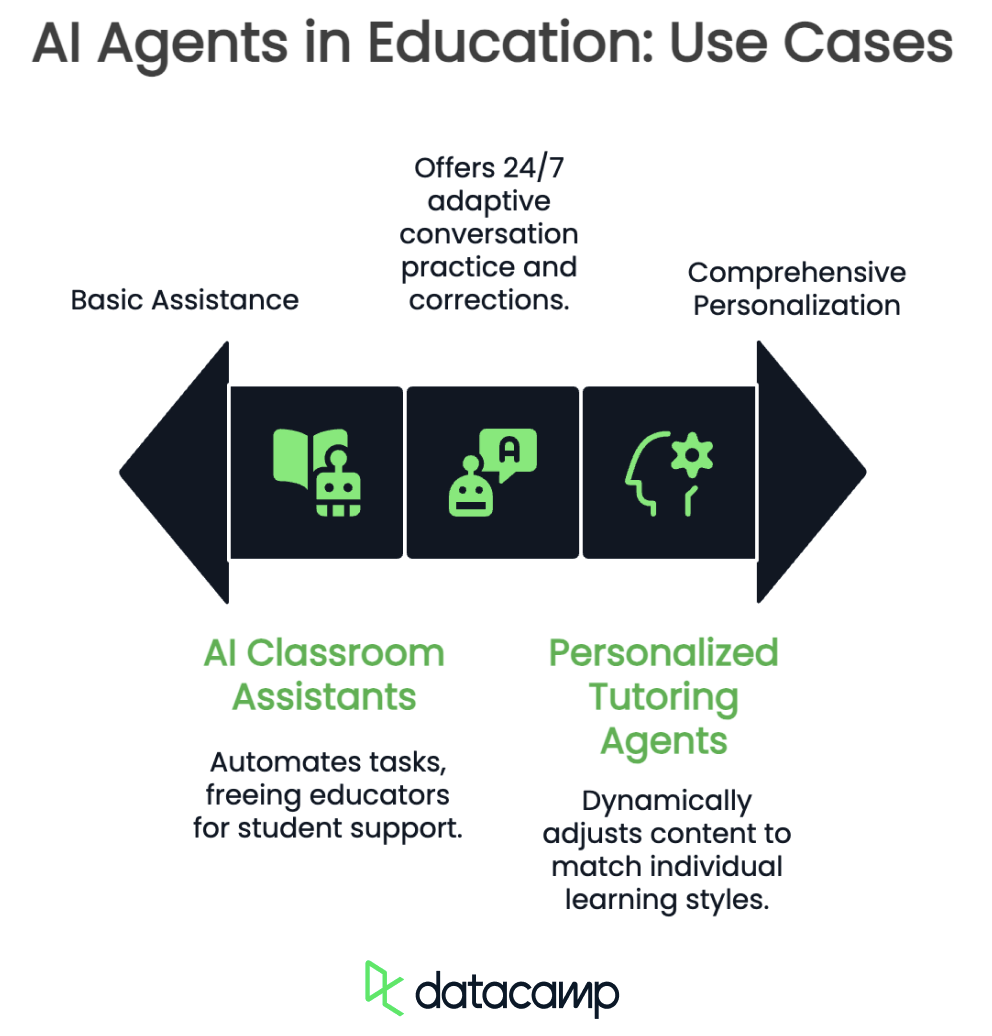
Benefits
AI agents in education deliver benefits by creating scalable, individualized learning experiences that were previously impossible to implement. By analyzing performance data in real-time, AI agents can identify individual learning gaps, curate resources, generate custom learning experiences, and provide immediate feedback and support.
Essentially, AI agents enable the creation of an individualized education program for every student simultaneously, without the traditional time and labor constraints.
Challenges
However, there are some challenges involved. An over-dependence on AI tools might make students reliant on immediate feedback and guidance rather than developing independent problem-solving strategies, which could, in the long run, be detrimental to their critical thinking skills.
Perhaps most concerning is the potential for motivation loss when students interact primarily with AI rather than human teachers, as the absence of authentic human connection and encouragement could diminish intrinsic motivation and emotional engagement with learning material.
AI Agents in Logistics and Supply Chain
Use cases
In the realm of logistics, it’s all about efficiency. Use cases for AI agents include:
- Dynamic route optimization agents
- Inventory coordinators
- Supplier negotiation agents
Traditional route planning methods usually try to find the shortest or fastest route. They often don't adjust to evolving conditions, causing delays when unexpected obstacles arise, like traffic jams or road closures. AI route optimization agents solve this issue of static routes by continuously analyzing real-time data from sources like GPS, traffic databases, and weather forecasts. They then dynamically recalibrate routes with the new information to avoid congestion and optimize delivery paths.
Businesses face significant challenges in maintaining optimal inventory levels across multiple locations, leading to stockouts or excess inventory that ties up capital and warehouse space. Inventory management AI agents address this by analyzing vast amounts of data-including sales history, market trends, and even weather patterns, to predict future demand with unprecedented accuracy, then automatically adjusting stock levels and triggering reorders across warehouse networks.
Walmart's advanced AI routing system combines both by predicting demand at individual store locations while factoring in historical sales, market trends, and weather conditions. The optimization of inventory movement and delivery routes significantly both reduces transportation costs and improves delivery times.
Procurement teams struggle with inefficient negotiation processes that are time-consuming, inconsistent, and often miss opportunities for cost savings due to limited data analysis capabilities. AI negotiation agents transform this process by autonomously evaluating supplier bids using historical data such as proposals, past discounts, and external macroeconomic indicators, then generating strong negotiation strategies and directly negotiating with suppliers to secure optimal terms.
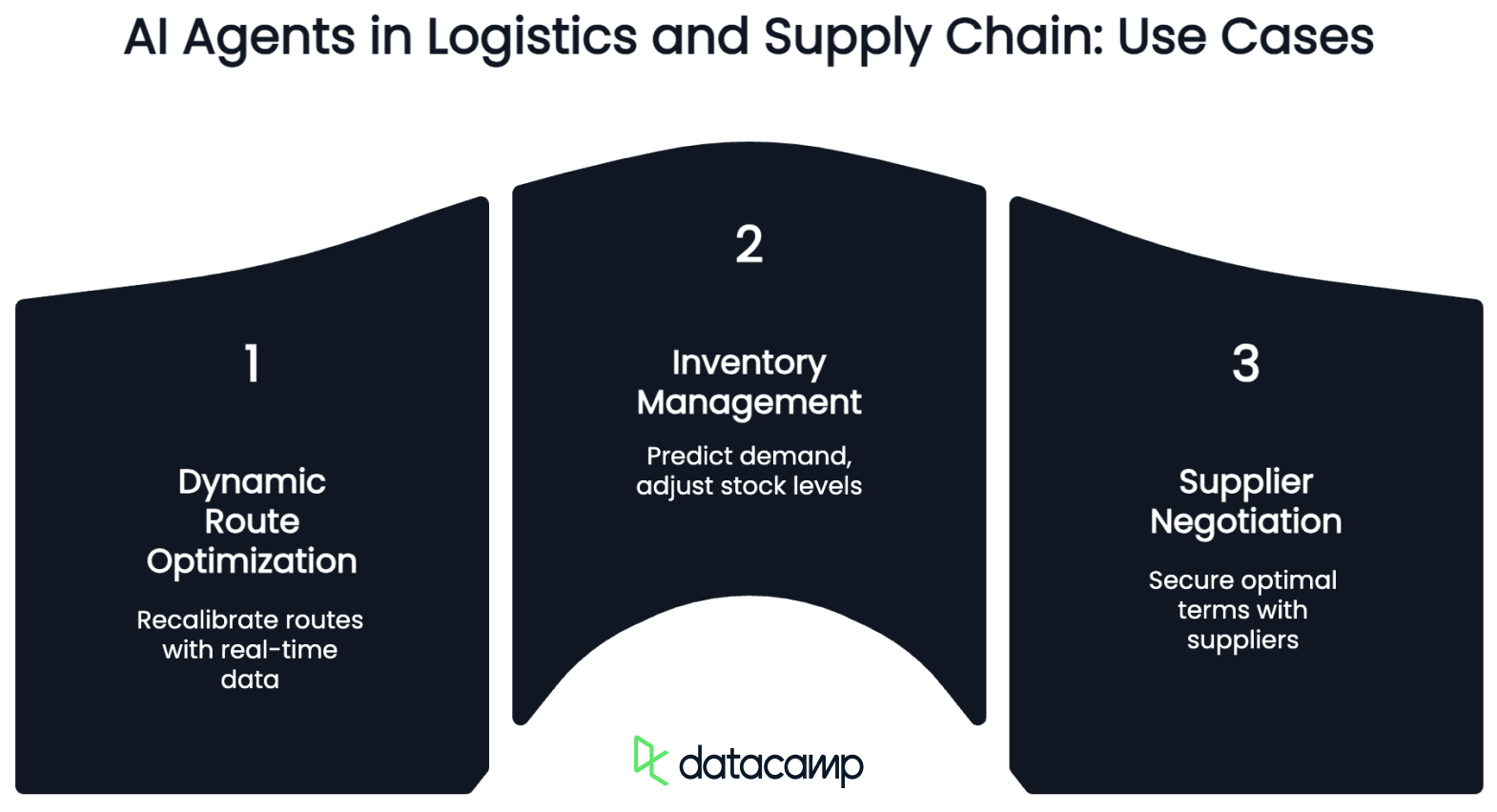
Benefits
AI agents in logistics and supply chain management provide improved efficiency. From a cost perspective, organizations implementing AI-driven supply chain solutions can expect a significant reduction in logistics costs through optimized transportation, reduced labor expenses, and minimized inventory holding costs. Perhaps most valuable in today's volatile market is the increased resilience these systems provide, as they continuously monitor potential disruptions from weather, political events, and economic indicators, enabling proactive risk management through alternative routing and contingency planning.
Challenges
Despite their advantages, AI agents in logistics face several operational and strategic hurdles. First, integrating AI systems with legacy supply chain infrastructure is often complex, especially when data is siloed across ERP systems, warehouse management platforms, and transportation software. Many organizations still operate with fragmented or inconsistent data, limiting the accuracy of AI predictions and automations.
Second, the dynamic nature of supply chains means agents must constantly adapt to disruptions—from geopolitical events to natural disasters—which can introduce brittleness if the models aren’t frequently retrained on updated data. Without continuous monitoring, even a well-performing agent can lead to misallocations or stockouts when conditions change.
Finally, ethical and contractual concerns arise with negotiation agents that autonomously engage with suppliers. These agents must strike the right balance between cost savings and supplier relationships, and organizations need oversight mechanisms to prevent overly aggressive or legally risky behavior.
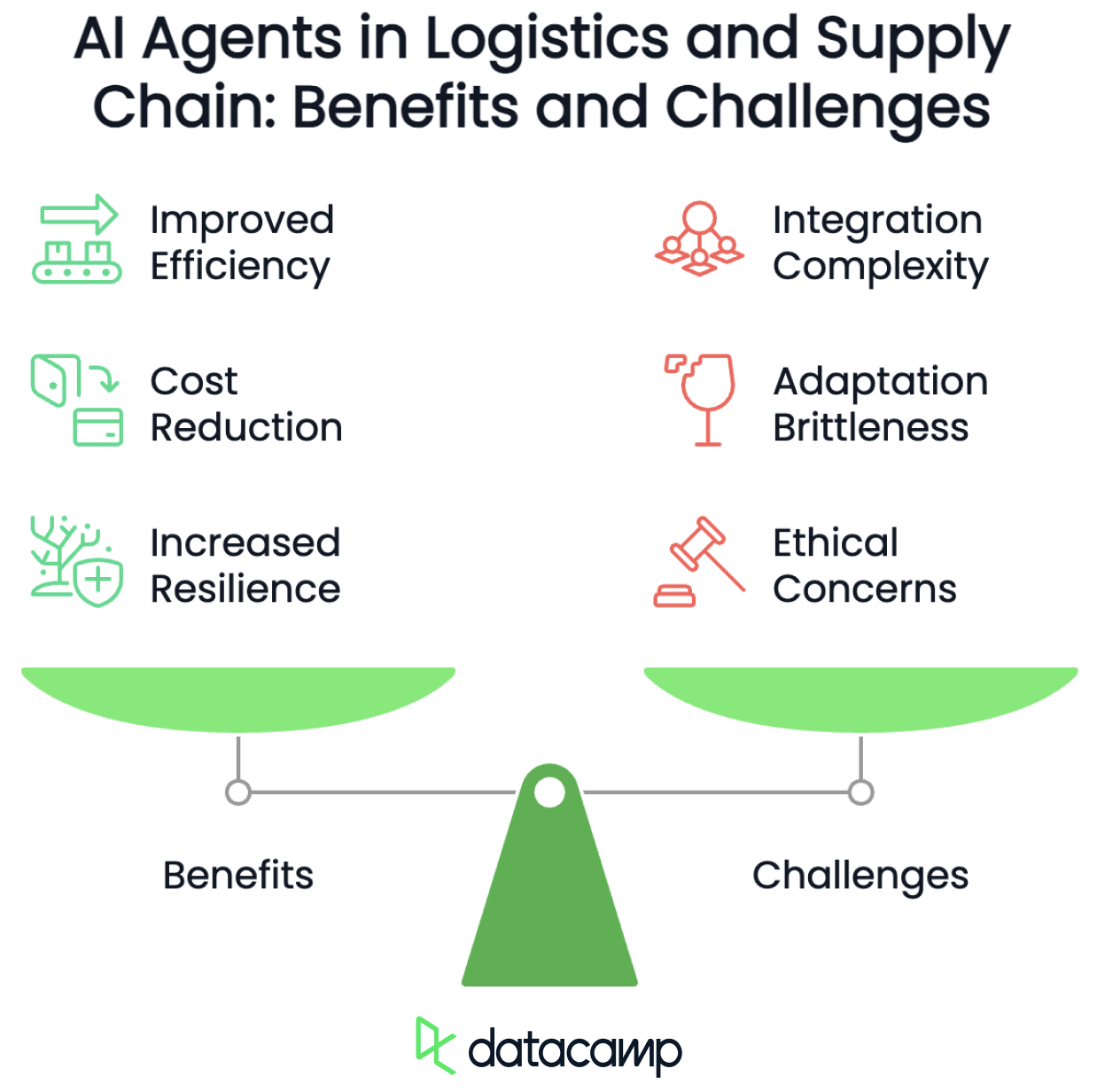
AI Agents in Marketing and Sales
Use cases
Finally, we take a look at the following use cases in marketing and sales:
- Lead qualification agents
- Content generation agents
- A/B testing agents
Sales teams waste valuable time on unqualified leads, leading to inefficient resource allocation and lower conversion rates. Lead qualification AI agents solve this by analyzing prospect behavior, engagement levels, and demographic data to automatically score leads, prioritize high-potential prospects, and engage them through their preferred channels before human sales representatives get involved.
Creating high-quality, personalized content across multiple channels is challenging, but essential. Content generation AI agents like Jasper AI address content gaps and inconsistent messaging by analyzing brand voice, audience preferences, and performance data to autonomously create, optimize, and distribute tailored content for social media, email campaigns, and advertisements.
Traditional A/B testing is slow, labor-intensive, and limited by human assumptions, making it difficult to optimize marketing campaigns efficiently. AI-powered A/B testing agents like Kameleoon solve this by autonomously choosing variables, automatically generating multiple variations, and analyzing real-time performance data, so resources can be dynamically allocated to better-performing versions without waiting for test completion.
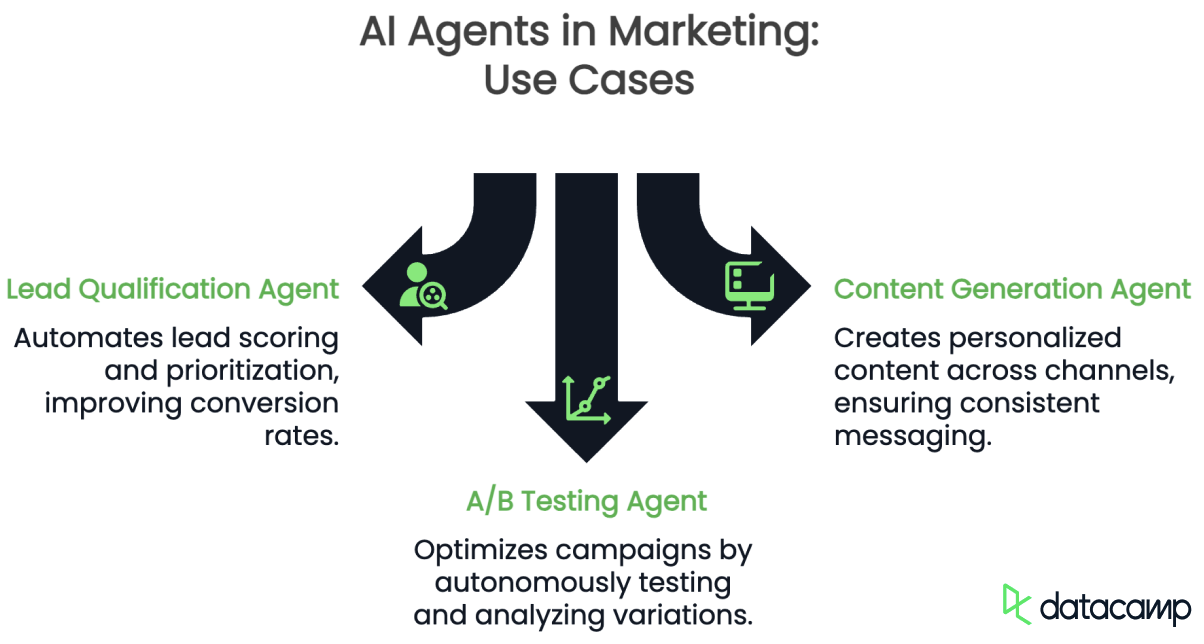
Benefits
AI agents in marketing and sales enable faster campaign iteration by automating content creation, testing multiple variables simultaneously, and dynamically reallocating resources to successful approaches without waiting for traditional test cycles to complete.
They not only save precious time but also deliver more personalized outreach by analyzing individual customer data and behavior patterns, resulting in higher engagement rates and conversion metrics than standardized approaches.
Challenges
AI agents in marketing offer speed and scale, but not without trade-offs. One major challenge is brand consistency. Content generation agents, especially those trained on general-purpose language models, may inadvertently produce messaging that deviates from the brand’s tone, includes biased language, or references outdated information unless carefully fine-tuned and monitored.
Another key issue is over-personalization. While personalization can boost engagement, overly intrusive targeting based on behavioral data can lead to user discomfort or even regulatory scrutiny under data privacy laws like GDPR or CCPA. This is especially true when AI agents operate in black-box mode and marketers cannot fully explain how decisions were made.
Lastly, measuring ROI on AI-driven campaigns can be difficult if attribution models aren’t properly adjusted to account for autonomous agent activity. Without clear reporting pipelines and performance benchmarks, teams may misinterpret results or struggle to justify investment in these tools.
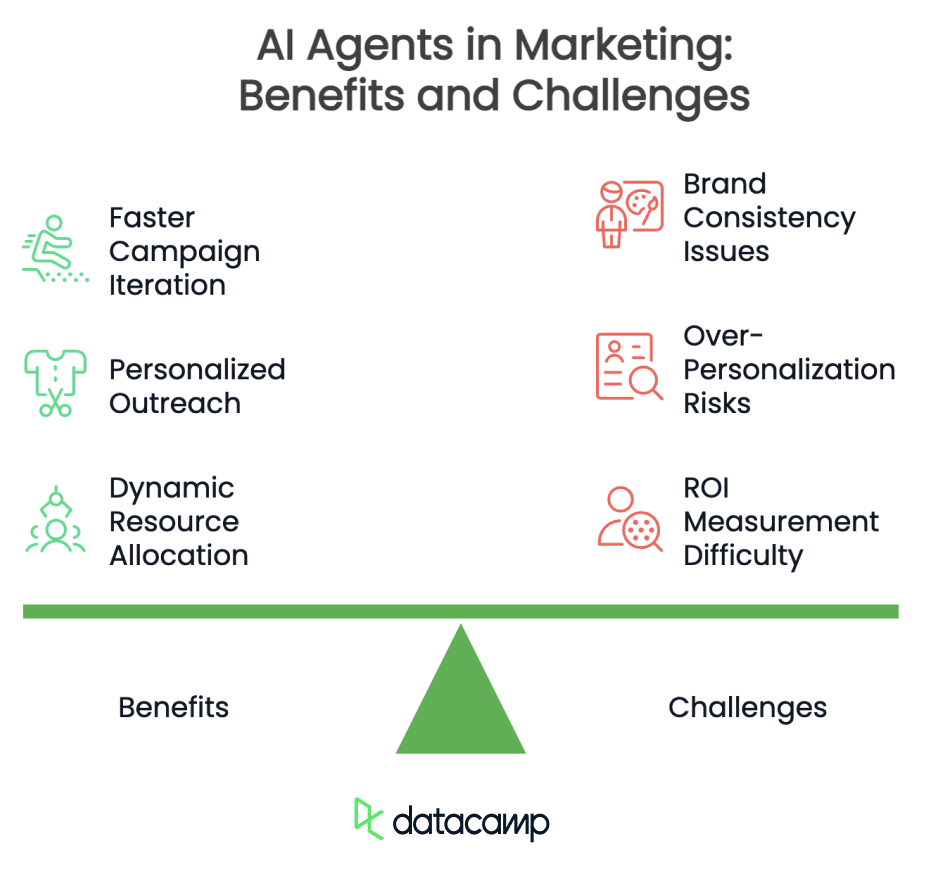
Conclusion
The excitement surrounding AI agents is well-founded, as their impact is already visible across industries from healthcare to logistics and marketing. Common themes in the various applications are autonomous collaboration, prioritization of tasks, and continuous re-evaluation of strategies in real time.
We keep our readers updated on the latest in AI by sending out The Median, our free Friday newsletter that breaks down the week’s key stories. Subscribe and stay sharp in just a few minutes a week:

Data Science Editor @ DataCamp | Forecasting things and building with APIs is my jam.
